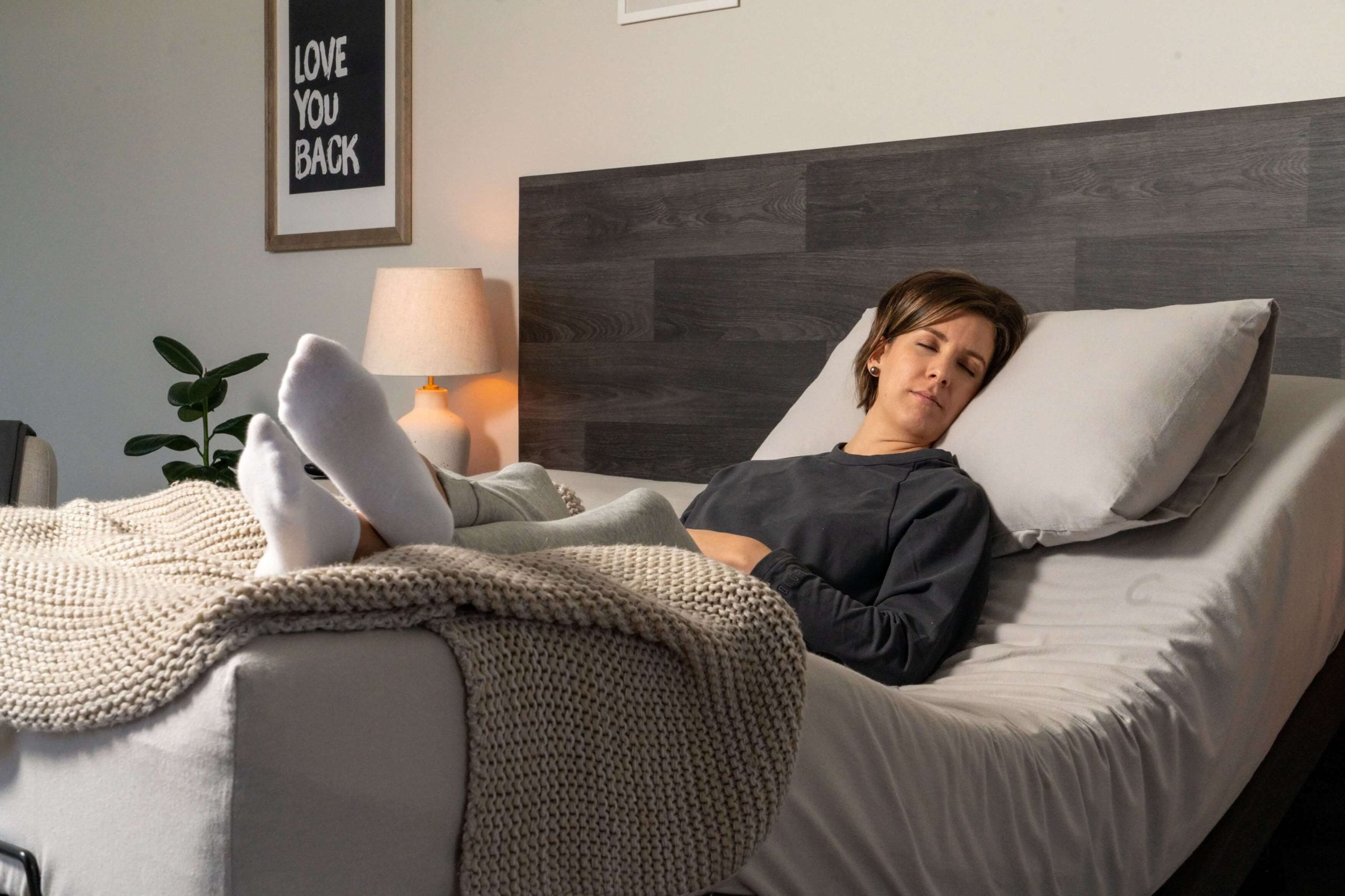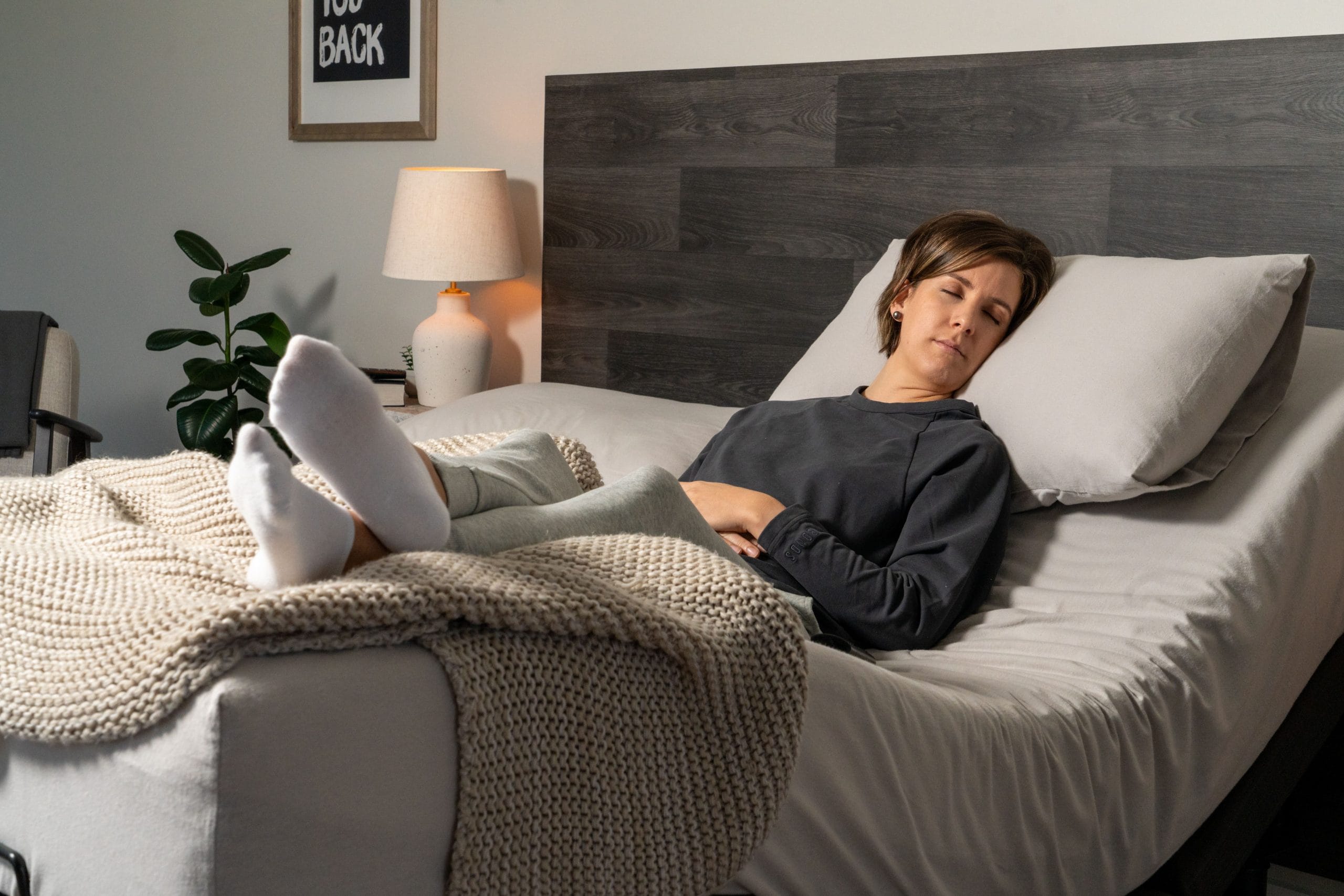
Did you know that sleep is more than just a way to rest and recharge your body? While most people know that getting enough sleep is important for overall health, many are not aware of the different stages of sleep that occur during a typical night’s rest.
One stage, in particular, deep sleep, plays a crucial role in our physical and mental well-being. Getting the right amount of deep sleep each night is essential for optimal functioning and productivity.
But how much deep sleep should you aim for?
Let’s take a closer look at the importance of deep sleep and how to get the recommended amount.
What is Deep Sleep?

Deep sleep, also known as slow-wave sleep (SWS), is the third stage of non-rapid eye movement (NREM) sleep. It typically occurs within the first few hours of falling asleep and makes up about 20-25% of our total sleep time.
During this stage, brain activity slows down significantly, and our bodies enter a state of physical relaxation.
But don’t let the name fool you—deep sleep is anything but a passive state. In fact, it is a crucial time for our bodies to repair and rejuvenate. Our brain waves slow down, allowing our body to focus on repairing and regenerating tissues, strengthening our immune system, and consolidating memories.
During deep sleep your heart rate will slow, your breathing becomes more regular and your muscles relax. It is also the time when our bodies produce important hormones like growth hormone, which helps with tissue repair and regeneration.
A lot of people focus on their REM sleep, which is our light sleep cycle when most dreaming occurs and is associated with cognitive and emotional restoration. However, deep sleep is just as important for our overall health and well-being if not more so.
The Importance of Deep Sleep

While all stages of your sleep cycle are essential for proper functioning, the deep sleep stage has some unique benefits that make it crucial for our overall health.
Physical Restoration: As mentioned earlier, deep sleep is the stage where our bodies enter a state of physical relaxation and can focus on repairing and regenerating tissues. This stage is particularly important for athletes or anyone who engages in physical activity, as it helps with muscle recovery and growth.
Mental Rejuvenation: Deep sleep is not just crucial for our physical health, but also for our mental health. It allows our brain to rest and recharge, promoting cognitive function, memory consolidation, and emotional regulation. The older you get the more retaining deep sleep becomes, making it crucial for maintaining cognitive health as we age.
Hormonal Balance: During deep sleep, the production of growth hormone increases. This hormone helps with tissue repair and muscle building, as well as regulating metabolism and immune system functions. Lack of deep sleep can disrupt this balance and lead to issues such as weight gain, weakened immunity, and hormonal imbalances.
Mood Regulation: Adequate deep sleep has been linked to improved mood stability and a decrease in symptoms of anxiety and depression. On the other hand, chronic lack of deep sleep can lead to irritability, mood swings, and increased risk of mental health disorders.
Sleep really is the glue that holds our physical and mental well-being together. Deep sleep, in particular, plays a crucial role in keeping our bodies and minds functioning at their best.
So next time you’re tempted to stay up late binge-watching your favourite show or scrolling through social media, remember the many benefits of a healthy sleep cycle and make sure to prioritise it in your daily routine.
How Much Deep Sleep Do I Need?

So how much deep sleep do we actually need? This all depends on how much sleep you get in total. On average, adults need 7-9 hours of sleep per night, with deep sleep accounting for 20-25% of that time.
This means that ideally, we should aim for around an hour and a half to two hours of deep sleep each night.
Most adults experience the longest amount of deep sleep in the first half of their night’s rest, so it’s important to prioritise getting enough quality sleep during these crucial hours.
Typically, you’ll experience deep sleep in cycles throughout the night, with each cycle lasting around 90 minutes. So even if you don’t get an exact number of hours of deep sleep every night, as long as you’re getting enough overall and prioritising quality sleep, your body will still reap the benefits.
However, everyone’s sleep needs are different and can vary based on age, lifestyle factors, and individual health conditions. For instance, if you’re coming off a busy week and haven’t had adequate sleep, your body may need extra deep sleep to make up for the sleep deprivation.
And if you’re a nap taker, your deep sleep decreases at night since some of that requirement may be fulfilled during your naps.
It’s important to listen to your body and pay attention to how you feel after a good night’s rest, as this can give you insight into your personal needs for deep sleep.
While it may seem daunting to try and track your sleep cycles and aim for a specific amount of deep sleep each night, there are now many wearable devices and smartphone apps that can help monitor your sleep patterns and provide insights into your deep sleep stages.
Sleep Disorders and Deep Sleep Disruptions

Unfortunately, not everyone is able to achieve the recommended amount of deep sleep each night. Sleep disorders such as insomnia, sleep apnea, and restless leg syndrome can all disrupt our ability to reach deep sleep stages.
Insomnia, which is characterised by difficulty falling or staying asleep, can lead to a lack of overall sleep time as well as fragmented or shallow sleep cycles. This means that even if you do fall into deep sleep, it may not be enough or long-lasting enough to reap all the benefits.
Sleep apnea is a disorder where breathing pauses and restarts during the night, causing interruptions in deep sleep. This disruption can also lead to daytime fatigue and other health issues.
Additionally, restless leg syndrome (RLS) can cause uncomfortable sensations in the legs that make it difficult to fall asleep and stay asleep. This constant movement or urge to move can disrupt deep sleep and lead to daytime fatigue as well.
If you suffer from any of these sleep disorders, you might want to look into a new mattress or pillows that can help support your body and alleviate any pressure points that may be contributing to your discomfort.
Improving Deep Sleep Quality

Aside from addressing any underlying sleep disorders, there are also lifestyle changes you can make to help improve the quality of your deep sleep. Some tips include:
Establishing a consistent bedtime routine:
Going to bed and waking up at the same time each day can help regulate your body’s internal clock and promote better overall sleep.
Create a comfortable sleeping environment:
Make sure your bedroom is dark, cool, and quiet to promote deeper sleep. Consider investing in blackout curtains or white noise machines if needed.
Avoid caffeine, alcohol, and heavy meals close to bedtime:
These substances can disrupt your ability to fall asleep and stay asleep deeply.
Practice relaxation techniques before bed:
Deep breathing, meditation, or gentle stretching can help relax your body and mind before bedtime, promoting deeper sleep.
Exercise regularly:
Regular physical activity can help improve the quality of your sleep overall, including deep sleep. Just make sure to avoid intense exercise close to bedtime as it can stimulate the body and make it difficult to fall asleep.
Check out our guide to the best sleeping tips to improve your overall sleep quality.
The Role of Lifestyle in Deep Sleep

You might think that what you do when you’re awake has nothing to do with your deep sleep, but that’s not entirely true. The lifestyle choices you make during the day can greatly impact the quality of your sleep at night.
For example, a healthy diet and regular exercise can help promote better overall sleep, including deep sleep.
On the other hand, consuming caffeine or alcohol close to bedtime, as well as staying up late watching TV or scrolling through your phone, can disrupt your body’s natural sleep-wake cycle and make it harder to achieve restful deep sleep.
Additionally, stress and anxiety from daily life can also negatively affect your ability to fall into a deep sleep. Finding ways to manage and reduce these sources of stress can ultimately lead to better overall sleep.
Within the first 30 minutes of waking up, try to get out in the sunlight to help regulate your body’s natural sleep-wake cycle. Exposure to natural light during the day can also improve sleep quality, making it easier for you to achieve deep and restful sleep at night.
By making small changes to your daily routine and prioritising healthy habits, you can improve the quality of your deep sleep and reap the many benefits that come with it.
The Benefits of Deep Sleep for Physical Recovery

Deep sleep plays a crucial role in physical recovery, making it an essential component of a healthy lifestyle.
During deep sleep, the body engages in major repair work, including muscle growth, tissue repair, and protein synthesis. This stage of sleep is particularly important for individuals who engage in physical activities, such as athletes or fitness enthusiasts, as it helps in recovering from physical exertion.
Hormones, such as human growth hormone (HGH), are released during deep sleep, which aids in cell regeneration and muscle repair.
Additionally, deep sleep bolsters the immune system, helping the body fend off infections and illnesses. By understanding the importance of deep sleep for physical recovery, individuals can prioritise getting adequate, quality sleep to enhance their overall physical health and performance.
If you’ve been hitting the gym for a while now, and you aren’t seeing the results you want, it might not be your workout that needs adjusting. Instead, it could be the quality of your sleep.
Insufficient deep sleep can lead to increased fatigue and slower physical recovery after a workout, which can hinder progress and make it harder to achieve fitness goals.
The Impact of Deep Sleep on Mental Health

Not only is deep sleep crucial for physical recovery, but it also plays a significant role in mental health.
During the deep stages of sleep, the brain engages in essential processes such as consolidating memories and processing emotions, which are vital for learning and overall cognitive function. This phase of sleep allows individuals to organise and retain information from the day, facilitating better recall and understanding when awake.
Moreover, it enhances emotional regulation, helping individuals cope with stress and navigate daily challenges more effectively.
A lack of quality deep sleep has been linked to an increased risk of mental health disorders such as depression and anxiety. When individuals do not get enough restorative sleep, their ability to manage emotions diminishes, leading to heightened feelings of irritability and mood swings.
Furthermore, research has shown that individuals who struggle with chronic insomnia are not only more likely to experience symptoms of these conditions but may also find it increasingly difficult to break the cycle of poor sleep and mental health issues.
The interplay between inadequate sleep and mental health can create a vicious cycle, making it imperative to prioritise deep sleep for overall well-being.
Ensuring a consistent sleep schedule and adopting good sleep hygiene practices can help mitigate these risks and promote healthier sleep patterns.
How Much Deep Sleep Do You Need?

So back to the original question—how much deep sleep do you need? The amount of deep sleep required varies from person to person and depends on various factors such as age, lifestyle, and overall health.
But if you’re getting the recommended 7-9 hours of sleep per night, you can expect to spend around 20% of that time in deep sleep. Which is around 1.5-2 hours of deep sleep each night. This is when you’re in a restorative state, and your body can repair and rejuvenate itself. If you were to be woken up during this stage, you would feel groggy and disoriented.
If you’re not getting enough deep sleep, make it a priority to increase your overall sleep duration and quality. You may need to try a different bedtime routine, or maybe it’s time to invest in a new mattress. There are multiple factors that can impact the quality of your sleep, so it’s essential to pay attention and make necessary changes for better deep sleep.
Conclusion

Deep sleep plays a vital role in our overall mental and physical well-being. It is essential to prioritise getting enough quality deep sleep to support our daily functions and prevent potential mental health issues.
If you struggle with getting enough restorative sleep, make it a priority to establish good sleep hygiene practices and seek help if needed. Remember, investing in your sleep is investing in your overall health and happiness.
At the end of the day, the relationship between deep sleep and mental health highlights the importance of prioritising healthy sleeping habits. From reducing symptoms of mental health conditions to improving mood regulation, deep sleep plays a crucial role and at Letto, we want to help you achieve the best sleep possible.
